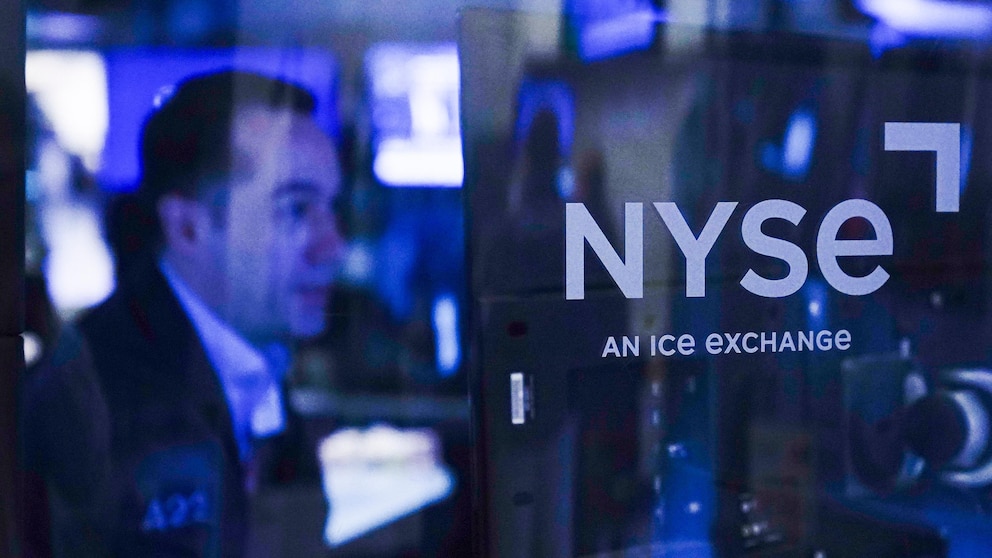
NEW YORK — Wall Street tumbled Thursday, dropping nearly 10% below its high mark for the year, after big-name companies warned an uncertain global economy may hurt their profits.
The S&P 500 fell 1.2% for its ninth drop in 11 days and touched its lowest level in five months. Another steep fall for Big Tech dragged on the market, sending the Nasdaq composite to a market-leading loss of 1.8%, while the Dow Jones Industrial Average sank 251 points, or 0.8%.
Meta Platforms was among the market's heaviest weights and tumbled 3.7% even though the parent company of Facebook and Instagram reported fatter profit and revenue for the summer than analysts expected.
Investors may have been spooked by the company’s warning that it’s seen some initial softness in advertising due to the latest Israel-Hamas war, and analysts said the company gave a wider range than it has in the past for its forecast of upcoming revenue.
Meta is one of the “Magnificent Seven” Big Tech stocks that were responsible for a huge chunk of the S&P 500's gains through the first seven months of the year. Because they're so immense in size, their stock movements carry extra weight on the S&P 500 and other indexes. And their tremendous rallies earlier this year mean big expectations have built for them, raising the bar for their profit reports.
Two of the Magnificent Seven offered reports earlier this week that Wall Street saw as mixed, with Alphabet tumbling 9.5% and Microsoft rising 3.1% on Wednesday.
Thursday's further drops for Big Tech came even though yields eased in the bond market, which has been at the center of sharp moves for financial markets around the world for months.
The yield on the 10-year Treasury fell to 4.84% from 4.96% late Wednesday. Early in the morning, it had neared its highest level since 2007. Yields swung after reports showed the U.S. economy continues to storm ahead despite much higher interest rates that have already lashed the stock market.
A preliminary estimate suggested the U.S. economy’s growth accelerated during the summer by more than economists expected. A separate report indicated the U.S. job market remains remarkably solid, with relatively few layoffs across the country. And the European Central Bank opted to refrain from hiking interest rates for the first time in more than a year.
Stocks have been under pressure since the summer as Treasury yields have spurted higher. They have been catching up with the main interest rate controlled by the Federal Reserve, which is at its highest level since 2001 as the central bank tries to get high inflation under control.
Higher bond yields make investors less willing to pay high prices for stocks and other investments. They also slow the economy bluntly, raising the risk of a recession in the future, and increase the pressure across the financial system.
Thursday’s reports show the U.S. economy is clearly not in a recession. But Wall Street is more concerned about what will happen rather than what’s in the past, and the worry is that a solid economy could put continued upward pressure on inflation. That in turn could push the Fed to keep rates high for a long time to defeat high inflation. And that could mean eventual weakness for the economy and corporate profits.
“The Fed’s job isn’t done, and it does not appear that higher interest rates are doing the job for them,” said Quincy Krosby, chief global strategist for LPL Financial.
In the near term, traders overwhelmingly expect the Federal Reserve to hold rates steady at its next meeting, which ends Wednesday. That would mark a second straight meeting where the Fed did not hike its main interest rate, which it has pulled above 5.25% from nearly zero early last year.
“Higher and hold, yes,” said Lindsay Rosner, head of multi-sector fixed income investing at Goldman Sachs Asset Management. “Higher and hiking, no.”
Even better-than-expected profits from big U.S. companies haven’t been enough to arrest the market’s recent slide.
The majority of companies in the S&P 500 have been topping analysts’ profit expectations for the summer, and the hope is that they'll report their first overall growth in a year. But several big-name companies fell Thursday following disappointing results or forecasts for upcoming trends.
UPS sank 5.9% after cutting its forecasts for some full-year results because of uncertainty about where the global economy is heading. Investors see UPS as a window into the global economy’s strength because it ships so many products around the world.
Align Technology, which makes Invisalign systems that straighten teeth, also said an uncertain global economy may persuade potential customers to hold off. Its stock tumbled 24.9% after it reported weaker profit and revenue for the latest quarter than expected.
On the winning side of Wall Street was IBM, which rose 4.9% after reporting stronger profit and revenue for the latest quarter than analysts expected.
All told, the S&P 500 fell 49.54 to 4,137.23. The Dow dropped 251.63 to 32,784.30, and the Nasdaq sank 225.62 to 12,595.61.
In stock markets abroad, indexes fell in Europe after dropping more sharply in Japan and South Korea. Stocks edged higher in Shanghai.
___
AP Business Writer Elaine Kurtenbach contributed.
Sourse: abcnews.go.com






